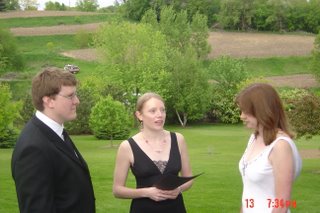1. What exactly was your role in publishing the Harry Potter series?
I serve as continuity editor for the Harry Potter series in the United States. In practice this means I am the chief copyeditor for the series: I do my best to make sure that the hundreds of magical names, places, spells, objects, etc. that come up in Ms. Rowling’s universe are spelled or used correctly every single time they appear, and when we’re working on a new book, I oversee the U.S. copyediting process and the other copyeditors and proofreaders who work on the book.
2. Did you get to work directly with the author, J. K. Rowling, on publishing her books?
My boss, Arthur A. Levine, works directly with Ms. Rowling.
3. How long have you been working at Arthur A. Levine Books and have you enjoyed your time spent working there?
I’ve worked there for almost six years now, since September 2000, and I really love it, yes!
4. Have you always dreamed of being an editor in a successful publishing company like the one in which you currently work?
Until I was a junior in high school, I thought I wanted to be a doctor. But then I realized that I really preferred reading to cutting things up, so I looked for a career that would let me read all the time, and I decided I wanted to be an editor. So the answer to your question is “Yes,” if “always” begins with my junior year. :-)
5. What exactly is your role as the editor? What responsibilities do you have?
An editor has three main responsibilities:
- When authors or agents send us manuscripts, we choose the ones that we think should be published, and we convince the publishing company to buy them.
- Once they’re bought, we work with the authors to make them the best books they can be . . . sometimes changing the story or characterizations, sometimes cutting unnecessary developments or words, sometimes just correcting spelling and so on . . .
- And then we work with all the other parts of the company (design, marketing, sales) to make the book as beautiful and saleable as it can be, and then to get the word out and hopefully make it a bestseller.
6. Are there any drawbacks to your job as an editor in a publishing company?
It’s frequently quite stressful. And lots and lots of authors send me manuscripts, so I’m always behind in my reading.
7. How do you decide which books to publish and which to reject?
I look for books with wonderful characters and interesting stories, revealed through atmospheric language and with emotional meaning.
8. What other popular books or authors have you worked with?
I work with Lisa Yee, author of Millicent Min, Girl Genius and Stanford Wong Flunks Big-Time; Kate Constable, author of the lovely Chanters of Tremaris fantasy trilogy; Saxton Freymann, a food sculptor who has created How Are You Peeling?, Fast Food, and Food for Thought, among others; and Senator Ted Kennedy and Caldecott Medalist David Small, on My Senator and Me: A Dog’s-Eye View of Washington, D.C. I also edit many translations from foreign languages.
9. What books have been your favorite to work with and publish? And why?
This is like asking a mother to pick her favorite child! That said, probably Millicent Min, Girl Genius, because it was the first novel I was involved with in any meaningful way and I learned so much working on it. (And it paid off fantastically—it’s a terrific book!)
10. Which Harry Potter book has been your favorite publishing so far?
I’ve only worked on two—Half-Blood Prince and Order of the Phoenix—and I think I’d say Order, because it was the first one I was involved with and there’s so much great, rich, painful stuff in it.
11. What has been the most interesting moment you have had while publishing the Harry Potter books?
I met J. K. Rowling when she was here on a publicity tour in 2000; Arthur introduced me as his new assistant, and she took my copy of Prisoner of Azkaban and signed it, “To Cheryl—no doubt you will soon be sick of my name. J. K. Rowling.” :-)







